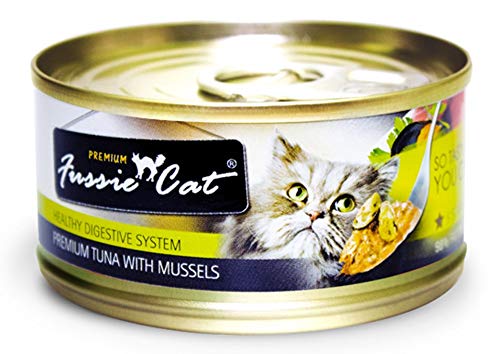Can Cats Eat Mussels?
As a cat lover, you might wonder if your feline friend can enjoy the delicious taste of mussels. Well, the good news is that cats can indeed eat mussels! These seafood delights can be a healthy addition to your cat’s diet in moderation.
Cats are obligate carnivores, which means their bodies are designed to thrive on a diet primarily made up of meat. While cats need essential nutrients like protein and amino acids, there are certain seafood options, like mussels, that can provide them with these necessary nutrients while also adding a little variety to their meals.
Mussels are packed with protein, which is essential for your cat’s overall health and well-being. Protein helps to support strong muscles and provides energy for your feline friend. Additionally, mussels contain omega-3 fatty acids, which have numerous benefits for your cat’s heart, coat, and skin.
However, it’s important to remember that moderation is key. While mussels can be a healthy treat for your cat, they should not be a staple in their diet. Too much seafood, including mussels, can lead to an imbalance of nutrients and cause health issues for your furry friend.
When introducing mussels into your cat’s diet, it’s crucial to ensure they are properly cooked and prepared. Raw or undercooked mussels may contain harmful bacteria or parasites that can be harmful to your cat’s health. So, always cook the mussels thoroughly, removing the shells and any potential contaminants.
Now that you know cats can indeed eat mussels, you can offer them as an occasional treat to provide some variety and additional nutrients to your cat’s diet. Just remember to feed them in moderation and ensure they are properly cooked.
Understanding a Cat’s Diet
As a cat lover, you want to ensure that you’re providing the best possible nutrition for your feline friend. Understanding a cat’s diet is crucial in making informed choices about what to feed them. Let’s take a closer look at what makes up a cat’s natural diet:
- Obligate Carnivores: Cats are obligate carnivores, which means they require a diet primarily consisting of meat. They need a high content of animal-based protein to thrive.
- Nutritional Requirements: Cats need certain nutrients such as taurine, arachidonic acid, and vitamin A that are found in animal tissues. These are essential for maintaining their overall health and wellbeing.
- Protein: Protein is a vital component in a cat’s diet as it helps build and repair body tissues. It also provides energy and supports their immune system.
- Essential Nutrients: Cats also require essential fatty acids, like omega-3 and omega-6, for healthy skin, coat, and brain function. These fatty acids are not produced in their bodies, so they must come from their diet.
- Water: Cats have a low thirst drive, so it’s crucial to ensure they stay hydrated. Wet cat food and access to fresh water can help prevent urinary tract issues.
Now that you have a better understanding of a cat’s dietary needs, let’s explore if mussels can be a suitable addition to their meals.
The Benefits of Seafood for Cats
Seafood can be a great addition to your cat’s diet and provide several benefits. As a cat lover, you know that cats are obligate carnivores and need a diet primarily consisting of meat. Seafood, including mussels, can be a delicious and nutritious option for them. Here’s why:
- High in Protein: Seafood, such as mussels, is packed with high-quality animal-based protein. Protein is essential for cats as it helps support their overall health, promotes muscle growth, and contributes to a shiny coat.
- Rich in Essential Nutrients: Seafood, especially mussels, contains essential nutrients like taurine and vitamin A. Taurine is crucial for cats’ cardiac health, while vitamin A supports their vision, immune system, and skin health.
- Source of Essential Fatty Acids: Seafood like mussels is also a good source of omega-3 and omega-6 fatty acids. These fatty acids are important for cats’ brain development, immune function, and maintaining healthy skin and coat.
- Palatability: Many cats find seafood, including mussels, highly palatable. Adding this variety to their diet not only adds enjoyment during mealtime but can also encourage them to eat more and maintain a healthy weight.
When it comes to feeding your cat seafood, it’s important to remember a few things:
- Moderation is Key: While seafood can have numerous benefits, it should be fed in moderation. Too much seafood can lead to an imbalance in their diet and may cause digestive issues.
- Cooked and Deboned: When feeding seafood to your cat, it should always be cooked thoroughly and deboned to avoid any potential health risks, such as choking or intestinal blockage.
- Introduction and Observation: Introduce seafood gradually into your cat’s diet and monitor their response. Some cats may have allergies or sensitivities to specific types of seafood, so it’s important to watch out for any adverse reactions.
Remember, every cat is unique, and their dietary needs may vary. It’s always a good idea to consult with your veterinarian before making any significant changes to your cat’s diet, including the introduction of seafood.
Are Mussels Safe for Cats?
As a cat lover, you may wonder if it’s safe to feed your feline friend mussels. Well, the good news is that mussels can be a safe and healthy addition to your cat’s diet. Here’s what you need to know:
- Nutritional Value: Mussels are packed with essential nutrients that can benefit your cat’s overall health. They are a great source of high-quality protein, which is crucial for maintaining healthy muscles. Additionally, mussels are rich in taurine, an important amino acid that cats need for proper heart function and vision.
- Omega-3 and Omega-6 Fatty Acids: Mussels are an excellent source of omega-3 and omega-6 fatty acids, which are essential for your cat’s skin, coat, and immune system. These fatty acids can help reduce inflammation and improve your cat’s skin and coat condition, making them soft and shiny.
- Cooked and Deboned: When it comes to feeding mussels to your cat, it’s important to cook them thoroughly and remove any shells or debris. Raw mussels can pose a risk of bacterial contamination, so it’s best to avoid them. Cooked mussels are safer for your cat to eat and easier for them to digest.
- Moderation is Key: While mussels can be a healthy addition to your cat’s diet, it’s important to feed them in moderation. Too much seafood can lead to an excess intake of certain minerals like phosphorus, which can be harmful to cats with kidney issues. Consult your veterinarian to determine the appropriate amount of mussels to include in your cat’s diet.
Introducing mussels to your cat’s diet should be done gradually. Start by offering a small amount and monitor your cat for any adverse reactions. If your cat shows any signs of allergies or digestive issues, stop feeding them mussels and consult your veterinarian.
Remember, every cat is different, and what works for one may not work for another. Your veterinarian can provide guidance tailored to your cat’s specific needs and dietary requirements.
So, go ahead and add some mussels to your cat’s mealtime menu. They can be a healthy and tasty treat that will make your feline friend purr with delight. Just remember to follow the guidelines for moderation, cooking, and deboning to ensure your cat’s safety and well-being.
How to Prepare Mussels for Cats
When it comes to feeding your feline friend, mussels can be a nutritious and delicious addition to their diet. But before you go ahead and serve up some tasty morsels, it’s important to take a few steps to ensure the mussels are safe for them to enjoy. Here’s a quick guide on how to prepare mussels for your cats:
- Selecting Fresh Mussels: Start by choosing fresh mussels from a reputable source. Look for mussels that are tightly closed or have just a slight gap. Avoid mussels that are cracked or have an unpleasant odor.
- Cleaning the Mussels: Rinse the mussels thoroughly with fresh water to remove any dirt, sand, or debris. Use a stiff brush to scrub away any stubborn particles. Discard any mussels that remain open after rinsing.
- Cooking the Mussels: To ensure the mussels are safe for your cat to eat, it’s essential to cook them thoroughly. Steam the mussels for around 3 to 4 minutes until the shells open. This cooking process helps kill any potential harmful bacteria or parasites.
- Removing the Shells: After cooking, allow the mussels to cool completely. Then, carefully remove the shells to eliminate the risk of choking or digestive issues. Remember to discard any broken or damaged shells.
- Cutting into Bite-Sized Pieces: Cats have smaller jaws, so it’s best to cut the mussels into bite-sized pieces. This makes it easier for them to eat and digest. Ensure the pieces are small enough to prevent any choking hazards.
- Moderation is Key: While mussels offer many health benefits, it’s important to remember that moderation is key. Introduce mussels gradually into your cat’s diet to avoid any potential digestive troubles. Offer them as a treat or a supplement to their regular balanced cat food.
Remember, not all cats will enjoy mussels, and some may have allergies or sensitivities to seafood. It’s always a good idea to consult with your veterinarian before adding any new food to your cat’s diet. Be mindful of any adverse reactions and adjust accordingly.
Conclusion
Now that you have all the information you need, you can confidently introduce mussels into your cat’s diet. Remember to choose fresh mussels from a reliable source and clean them thoroughly before cooking. Cooking the mussels for a few minutes will ensure they are safe for your cat to consume. Be sure to remove the shells to prevent any potential choking hazards. Cutting the mussels into bite-sized pieces will make it easier for your cat to eat.
However, it’s crucial to remember that moderation is key when introducing any new food to your cat’s diet. Always consult with your veterinarian before making any changes to ensure that it aligns with your cat’s specific dietary needs. With proper precautions and guidance, you can safely incorporate mussels into your cat’s meals, providing them with a tasty and nutritious treat.
Frequently Asked Questions
Can I feed mussels to my cat?
Yes, you can feed mussels to your cat. It is important to select fresh mussels from a reputable source.
How should I prepare mussels for my cat?
To prepare mussels for your cat, clean them thoroughly to remove any dirt or debris. Cook them for around 3 to 4 minutes to ensure they are safe for consumption.
Do I need to remove the shells before feeding mussels to my cat?
Yes, it is recommended to remove the shells before feeding mussels to your cat. This helps prevent choking or digestive issues.
How should I serve mussels to my cat?
It is best to cut the mussels into bite-sized pieces for easier consumption by your cat.
Can I give mussels to my cat regularly?
Moderation is key when introducing mussels to a cat’s diet. Consult with a veterinarian before adding any new food to ensure it is safe and appropriate for your cat.













